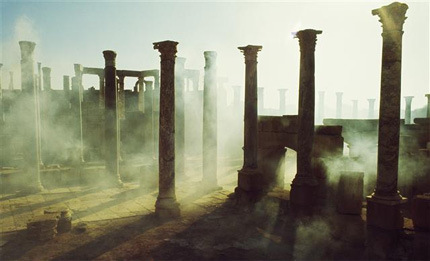The parallels between the waning days of the Roman Empire and present day America are obvious to anyone who knows their ancient history. Most of us however – self-indulgent, bored, shallow and complacent – don’t quite comprehend how close we are to tumbling into the dustbin of failed civilizations along with the bemused Romans.
For those willing to pay attention, Prof. Victor Davis offers this excellent comparison ~
The abrupt transition from a society of rural homesteaders into metropolitan coastal hubs had created two Romes. One world was a sophisticated and cosmopolitan network of traders, schemers, investors, academics, and deep-state imperial cronies. Their seaside corridors were not so much Roman as Mediterranean. And they saw themselves more as “citizens of the world” than as mere Roman citizens.
Hanson points to “The Satyricon,” a satirical novel written by a court insider named Gaius Petronius, which captured the zeitgeist of first century Rome ~
His novel’s accepted norms are pornography, gratuitous violence, sexual promiscuity, transgenderism, delayed marriage, childlessness, fear of aging, homelessness, social climbing, ostentatious materialism, prolonged adolescence, and scamming and conning in lieu of working.
Sound familiar?
The characters are fixated on expensive fashion, exotic foods, and pretentious name-dropping. They are the lucky inheritors of a dynamic Roman infrastructure that had globalized three continents. Rome had incorporated the shores of the Mediterranean under uniform law, science, institutions—all kept in check by Roman bureaucracy and the overwhelming power of the legions, many of them populated by non-Romans.
Is this Rome circa 60 A.D. – or present day America? ~
Never in the history of civilization had a generation become so wealthy and leisured, so eager to gratify every conceivable appetite—and yet so bored and unhappy […]
Globalization had enriched and united non-Romans into a world culture. That was an admirable feat. But such homogenization also attenuated the very customs, traditions, and values that had led to such astounding Roman success in the first place.
The multiculturalism, urbanism, and cosmopolitanism of “The Satyricon” reflected an exciting Roman mishmash of diverse languages, habits, and lifestyles drawn from northern and Western Europe, Asia, and Africa.
But the new empire also diluted a noble and unique Roman agrarianism. It eroded nationalism and patriotism. The empire’s wealth, size, and lack of cohesion ultimately diminished Roman unity, as well as traditional marriage, child-bearing, and autonomy […]
Petronius seems to imply that whatever the Rome of his time was, it was likely not sustainable—but would at least be quite exciting in its splendid decline.
Petronius also argues that with too much rapid material progress comes moral regress. His final warning might be especially troubling for the current generation of Western Europeans and Americans. Even as we brag of globalizing the world and enriching the West materially and culturally, we are losing our soul in the process.
Getting married, raising families, staying in one place, still working with our hands, and postponing gratification may be seen as boring and out of date. But nearly 2,000 years later, all of that is what still keeps civilization alive.
Most Americans don’t seem to appreciate the carefully-constructed, firm foundation established by the founders of our Constitutional Republic. The uniquely, exceptional legacy that they bequeathed to us is one that we simply no longer have the character, fortitude nor the wisdom to sustain. We’ve been running on inertia for more than 100 years. Unless there’s a sudden, wide-spread awakening, the country – as founded – can’t go on much longer.
~~~~~~~~~~~~~~~
Related:
Ephemeral Empires





